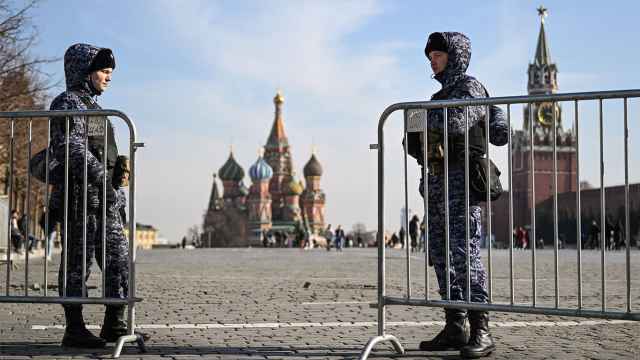New Mayor Sergei Sobyanin on Thursday promised to invest city funds into social issues rather than private companies and hinted that he would revise the Genplan, a disputed plan for the city's development through 2025.
Sobyanin, known for keeping a low public profile, did not speak to reporters before or after his swift confirmation as mayor by the Moscow City Duma and his inauguration immediately afterward.
Speaking before the City Duma vote, Sobyanin promised to focus on social issues, health care, education, transportation, construction, and fighting red tape and corruption.
He read his speech from a paper, stumbling a few times, but took the deputies' questions confidently and without pausing for feedback.
In particular, he told the deputies that the Genplan, a brainchild of former Mayor Yury Luzhkov, is “not untouchable” and may be changed in accordance with the city's current needs, Interfax reported.
But he said the plan, which critics claim ignores the needs of ordinary Muscovites, has a “pretty solid foundation.”
Sobyanin also said the city budget needed a "revision" to shift the focus from investments in private companies to financing social issues, education and health care.
But City Duma Speaker Vladimir Platonov later told reporters that he was "sure" that Sobyanin "would not revise the budget but study it."
Kremlin chief of staff Sergei Naryshkin presented Sobyanin to the deputies, telling them that "in all his previous jobs Sobyanin showed qualities of an organizer, a manager who can achieve goals he sets … and a leader who can unite people around him."
All 32 United Russia deputies voted for Sobyanin, while two Communists voted against him. One of the City Duma's three-strong Communist faction was sick Thursday.
"Let's work together for the benefit of Muscovites," Sobyanin said after the vote.
Platonov told The Moscow Times on the sidelines of the vote that he has known Sobyanin since 1996 when they both served as Federation Council senators on the same committee. He called him a "high-class professional" who is "progressive, even-tempered and makes balanced decisions."
Medvedev offered his congratulations after Sobyanin took the oath of office at a City Hall ceremony attended by city officials, city lawmakers, local dignitaries and religious leaders.
"The new mayor's task will be not only to maintain the standards that have been achieved, but to raise the living standards of Muscovites," Medvedev said in a televised speech.
In his inauguration speech, Sobyanin promised to maintain a dialogue with all political parties and nongovernmental organizations and to preserve the city's historical buildings and parks, Interfax reported.
United Russia deputies said they voted for Sobyanin because he was a member of their party. Communist deputies said they rejected him for the same reason.
Sobyanin was on a list of four mayoral candidates that United Russia earlier submitted to Medvedev.
"It is understandable that we had no disagreement whatsoever concerning our support for the candidates because they were all members of the same party," United Russia Deputy Andrei Metelsky told reporters after Thursday's vote.
Communist Deputy Andrei Klychkov lashed out at United Russia before the vote for failing to give his party an opportunity to propose mayoral candidates and creating "a parody of democracy" in the country.
Klychkov also accused United Russia of ordering Muscovites to pay for capital repairs for their apartment buildings, failing to solve traffic problems and not helping defrauded homebuyers, among other things.
While Klychkov was speaking, Platonov and his deputy Metelsky were literally laughing at him behind his back.
Metelsky tried to rouse his colleagues to applaud Sobyanin during the new mayor's speech, but only a few responded.
A Message from The Moscow Times:
Dear readers,
We are facing unprecedented challenges. Russia's Prosecutor General's Office has designated The Moscow Times as an "undesirable" organization, criminalizing our work and putting our staff at risk of prosecution. This follows our earlier unjust labeling as a "foreign agent."
These actions are direct attempts to silence independent journalism in Russia. The authorities claim our work "discredits the decisions of the Russian leadership." We see things differently: we strive to provide accurate, unbiased reporting on Russia.
We, the journalists of The Moscow Times, refuse to be silenced. But to continue our work, we need your help.
Your support, no matter how small, makes a world of difference. If you can, please support us monthly starting from just $2. It's quick to set up, and every contribution makes a significant impact.
By supporting The Moscow Times, you're defending open, independent journalism in the face of repression. Thank you for standing with us.
Remind me later.





